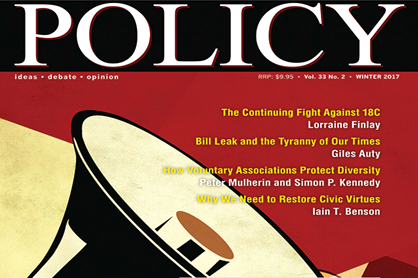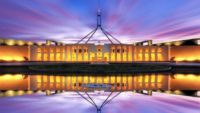Editor’s note: Will Jones, a UK-based writer and philosopher, has responded to Pete Mulherin and Simon Kennedy’s article in POLICY magazine about the importance of voluntary associations for a healthy liberal democracy. We appreciate the civil and thoughtful interaction with our work on this vital issue. You can read some more of his work here. Read on below:
Peter Mulherin and Simon Kennedy raise a number of critical issues in their timely piece “Archipelago or Landmass?: Voluntary Associations, Civil Society and the Health of Liberal Democracy.”
Their primary concern in the piece as I read it is to maintain a healthy liberal democracy, which they understand to be characterised not by uniformity or a ‘tyranny of the majority’, but by a social diversity which supports a marketplace of ideas. The former, they suggest, would be bordering on the totalitarian, whereas the latter safeguards basic political and civic freedoms, such as freedom of conscience and speech. The main thrust of their argument is that freedom of association, and the diverse voluntary associations which this freedom produces and protects, is a crucial element of a free and democratic society. Drawing on the work of Australian political theorist Chandran Kukathas, they characterise a liberal society with freedom of association as an archipelago of ideational islands to which individuals can choose to belong, each expressing its own ideas, beliefs and morals. They contrast this to a landmass picture of enforced and standardised homogeneity.
From the examples they cite it is clear that at the heart of their concerns is the protection of religious people from the clear and present danger of losing their ability to run their churches and organisations according to their particular values and to contribute to public debate. The big questions for the archipelago model are whether it will indeed achieve this purpose, whether in the process it won’t undermine much else that religious citizens would want to protect, and whether ultimately it can sustain itself. I have concerns about it on each of these counts.
At the centre of the archipelago model of society as Peter and Simon present it is a maximally permissive criterion for governing relations between persons and organisations: only inciting or perpetrating violence gives grounds for the state stepping in to prohibit or suppress free activity. Otherwise there is to be complete freedom and diversity. As they put it:
Apart from restraining violence and the advocacy of violence, the freedom of association of members must be protected and, by extension, the liberties of members to express their ideas, beliefs and morals.
But do they really mean this? Let us consider some examples of non-violent ideas, beliefs and morals which people, in their voluntary associations, might wish to promote and express. A racist organisation, for example, for whites only which expounds racialist theories about, say, Jews or blacks, and encourages members to shun them in their dealings and pushes for discriminatory policies in public life. A group which believes the age of consent should be lowered to 14 and expresses a lifestyle in line with that belief amongst its members. A group committed to the idea of euthanasia, same-sex marriage, polyamory, opiate use, or indeed anything which is currently banned. In the archipelago, may all these groups live a lifestyle in line with their moral beliefs amongst their own members? What about a group which believes taxation is theft – should their members be exempt from taxes? Should any of these groups be prohibited from living out their moral beliefs and ideas? If so, why, what reason can the archipelago advocate give, when no violence is involved?
If there is a wish to maintain standards across the archipelago, it is surely necessary to appeal to ideas and principles besides non-violence. A person might argue that all these examples involve violence in some form. It is hard to see how that can be the case in every one. But even if it is, all it shows is that what constitutes violence is among the ideas, morals and beliefs which people disagree about and will wish to express in their voluntary associations.
All of this suggests that the archipelago model is incomplete and will fail to protect all that citizens would wish. A second concern is that it may not even protect itself. Peter and Simon aptly cite William Galston pointing out that diversity with mutual toleration requires a framework of civic unity. The difficulty for the minimalist archipelago model presented here is that it isn’t clear that it will be adequate to achieve the measure of civic unity it needs to secure allegiance to the state and other civic institutions or willing compliance with its laws.
The needs of human psychology are such that willing compliance with the laws of a governing authority requires more than a minimal bare commitment to non-violence and diversity. It requires, for example, a sense of common ownership, of belonging, shared history, identity and destiny. This is most especially the case where there is an expectation, as is standard today, of substantial contribution to the mutual support of citizens through general taxation. Related to this are the important matters of social cohesion and trust, which contribute significantly to the well-being and economic prosperity of a society. Minimal unity and maximal diversity, as per the archipelago model, is not known to correlate well with these key social factors.
A third concern with the archipelago model is that, if carried to completion, it actually destroys one of the main goals that those who support it are hoping to secure: the right of religious believers to contribute to public debate and influence public policy. This is because under the model the only principle permitted to govern relations between ideational islands is non-violence. Everything else is deemed to run counter to the diversity and freedom the model is intended to secure, being regarded as an undue standardisation of morals and beliefs across society. Consider the example of same-sex marriage. The ban on same-sex couples from marrying is not about preventing violence. So how is it a legitimate law? Shouldn’t anyone who has a different moral belief be able to express that belief and get same-sex married? It is hard to see why not.
Furthermore, the idea of the state using its authority and resources to endorse marriage in any way becomes suspect. Marriage is not about preventing violence. So what business does the state have supporting marriage? Why should those who object to the concept of marriage have to contribute tax to support this state-sponsored institution? In the archipelago model it transpires that any public policy not based on the principle of non-violence is rendered illegitimate, ultra vires. While individuals and organisations might still technically be able to talk about them in public debate, there is no way they can become part of public policy, so there is no point doing so.
In sum, we have seen how the archipelago model of society does not allow us to maintain all the standards across society we would wish, does not provide a sufficient basis of civic unity to secure compliance with its own laws, and undermines one of its own key aims, the protection of the right of the religious to influence public debate.
My own view is that the archipelago model can suggest some helpful lessons for what it means to be a free, diverse and tolerant society. But it cannot be the whole picture. To integrate the insights of the archipelago idea with what we might call the virtues of landmass, I think we need to look more closely at the rational philosophical basis of the concept. The question needs to be asked: what would justify basing society on the archipelago model? What is the rational basis for its normative principles? Answering this will, I think, provide a way forward for integrating its important ideas with other key aspects of public justice and the public good.
By Will Jones







Recent Comments